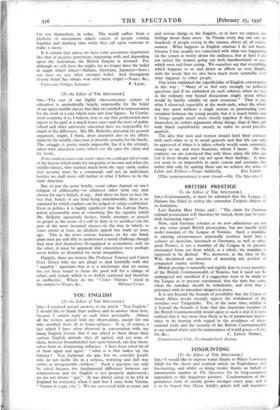YOU ENGLISH
[To the Editor of THE SPECTATOR.] S1R,—I received several answers to my article " You English." I should like to thank their authors and to answer them here, because I cannot reply to each letter personally. Almost all the writers agreed with my observations, except for one who ascribed them all to home-sickness. It is, of course, a fact which I have often observed in conversation with my many English friends that if one talked to them about their curious English attitude they all agreed, and yet none of them, however broadminded and open-hearted, can free them- selves from its dominating influence. I have been asked by all of them again and again : " what is it that makes up the balance ? You Austrians are gay, but we consider people who do not tackle life in a serious, worrying and dull way rather as irresponsible children." Such a question can only be asked because the fundamental difference between our temperament and the English is not properly understood ; we are not always " gay." (It was almost comic to be told in England by everyone, when I said that I came from Vienna, " Vienna is a gay city.") We are concerned with as many sad
and serious things as the English, or at least we express our feelings about them more. In Vienna every day one can see hundreds of people crying in the cinema, above all, of course. women. What happens in English cinemas I do not know, because I was usually too concerned with what was happening on the screen to worry about the audience, but at least I did not notice the women going out with handkerchiefs to eyes which were red from crying. We ourselves say that everything which happens to us and about us affects us very deeply, with the result that we also have much more sympathy with what happens to other people.
One letter explained the superficiality of English conversation in this way : " Many of us feel very strongly on political questions and if we embarked on such subjects when we met in the ordinary way heated discussions might ensue which would be hardly suitable on such occasions." That is just what I observed, especially at the week-ends, when the whole day was spent without a single serious or penetrating con- versation between the young people, but it is much better and it brings people much more closely together if they express themselves in violent arguments about things, than if they talk with bland superficiality merely in order to avoid possible quarrels.
The idea that men and women should limit their contacts with each other so as to avoid quarrels and that life can only be approved of when it is taken soberly would seem extremely strange to me and most Austrians whom I know. On the contrary, we are convinced that only those enjoy life who can feel it most deeply and can act upon their feelings. - It does not seem to us impossible to unite reason and emotion, but rather that only by uniting them can we achieve the sense of
















































 Previous page
Previous page